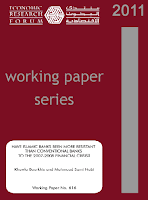The recent global financial crisis has induced a series of failures of many conventional banks and led to a renewal of Minsky’s (1986) critics about the inherent instability of the fractional-reserve banking. In this context, many economists advocate for the return to narrow banking and/or for favoring the development of Islamic banking, supposedly more resilient to the financial crises.
This paper attempts to answer empirically the following two questions: i) Have Islamic banks (IBs) been more resistant than their conventional peers (CBs) to the 2007-2008 financial crisis? ii) Could the presence of Islamic banks enhance the stability of conventional banks?
This paper attempts to answer empirically the following two questions: i) Have Islamic banks (IBs) been more resistant than their conventional peers (CBs) to the 2007-2008 financial crisis? ii) Could the presence of Islamic banks enhance the stability of conventional banks?
These are the main findings. Before the financial crisis, IBs were more profitable than CBs. Then, in 2007-2008, only the large IBs remained more profitable than the large CBs. However, IBs became less profitable in 2009 when the crisis’s pass-through to the real economy had sufficiently increased.
Moreover, we show that CBs were more resistant to the crisis than IBs. Hence, IBs illustrated a degree of resilience and stability during the first (financial) wave of the crisis. However, they have been impacted during the second (real) wave because of their higher exposure to real estate and their limited reliance on risk sharing instruments. Nevertheless, we find a positive externality of large IBs on the soundness of large CBs, which could be justified by their asynchronous reactions to the crisis. (source)
